Festival of Conversations Performances and Ideas
In 2021 IILAH turned 15 years old. This seemed like an excellent reason to celebrate, and to bring a touch of pleasure and conviviality after a (long) year of alienation. So, members of the IILAH community decided to come together to mark IILAH’s anniversary with a festival! We capped off our festival by the launch of the Routledge Handbook of International Law and the Humanities.
IILAH was established in 2005 by Professor Anne Orford. Under her leadership, IILAH became a thriving hub, charting new paths in scholarship, and placing Melbourne at the heart of many global collaborations in the humanities and international law. Her stated vision remains its guide. From 2012-2016, Professor Di Otto directed IILAH, leading it in new directions again, inflected by her own inimitable style. Since 2016, it has been my pleasure to serve as IILAH Director, and my even greater pleasure to be able to convene this festival to mark its 15th year (albeit a year late…). At each stage, the Directors have had exceptional support from the Melbourne Law School, the IILAH community of graduate researchers, faculty members, visitors and friends, and wonderful administrators, including Vesna Stefanovski, Chris Pidgely, Connor Foley, and now, Angela Hendley-Boys and her team.
But although we mark an anniversary, the festival is not a retrospective. Instead it looks forward, expressing the vibrancy of some of the current research being conducted under IILAH’s auspices. Through their creative conversations, performances and ideas, the researchers gathered in the festival stand as a synecdoche for the many fertile collaborations, projects and friends IILAH has produced over the last 15 years. They stand too, as an expression of hope for the future of engaged scholarship, collegial generosity and for what the university can be.

Festival events were recorded. You can listen to them via the IILAH Podcast
Tuesday 3 August 2021
| Romancing the Tomes with Margaret Thornton, convened by Johanna Commins and Ann GenoveseThis conversation with Professor Margaret Thornton reflected on the 2000 conference, Romancing the Tomes, which brought together feminist scholars working across law and the humanities under the auspices of the ANU Humanities Research Centre to address the fictions of law, the legal academy and judges through the lens of popular culture. |
Thursday 12 August 2021
| Love and Reparation: Book Launch with a Performed Reading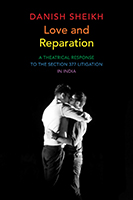 Danish Sheikh - A performed reading and conversation around Love and Reparation, a theatrical response to the decades-long litigation battle to decriminalize queer intimacy in India. Please note: This Festival event was postponed! |
Tuesday 17 August 2021
| Festival Skills CircleThis event talked about doing fieldwork, and were joined by special guests, Dr Debolina Dutta and Dr Amanda Gilbertson. This session was jointly convened with Dr Ben Golder and the UNSW Critique Network. |
Thursday 19 August 2021
| Visual Global PoliticsHilary Charlesworth (MLS) was in conversation with Roland Bleiker (Director of a cross disciplinary project on Visual Politics at UQ) to discuss the role of images and emotions in global politics, and in particular the politics and ethics of visualising humanitarian crises in particular, the subject of Professor Bleiker's new ARC Linkage project. |
Tuesday 24 August 2021
| Critique in the Tropics: The Crisis of Indian Legal Education and Scholarship, convened by Adil Hasan KhanThis panel featured contributions from academics trained in the law in India, and currently teaching at Indian universities, who reflected on the inheritances, futures and failures of a critical legal project for Indian legal education and scholarship. The panel touched on three questions in particular: 1) what might the humanities offer law?; 2) how to teach law from critical perspectives?; 3) is legal critique a political project? 4) What possibilities for acknowledging plurality [i.e., of laws] does tropical legal critique enable, and what might it limit?
|
Tuesday 31 August 2021
| International Law and the Politics of ComputationJames Parker, Jake Goldenfein, Fleur Johns, Andrea Leiter and Andre Dao in conversation on the questions of international law and technopolitics in the humanities. |
Thursday 2 September 2021
| Cine-legality with Gerry Simpson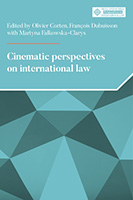 Gabrielle Simm was in conversation with Professor Gerry Simpson on international law and film scholarship. We will discuss Gerry's concluding chapter on 'Cine-Legality: International Law at the Movies' to Cinematic Perspectives on International Law and the role of the London Review of International Law (of which Gerry is an editor) in publishing most of the recent English language scholarship in this field. |
Tuesday 7 September 2021
| Sovereignty in the Anthropocene with Daniel Matthews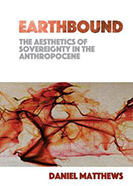 Dr Kathleen Birrell and Tim Lindgren were joined in conversation with Dr Daniel Matthews (University of Warwick) to discuss his new book Earthbound: The Aesthetics of Sovereignty . The conversation traversed the aesthetic force of sovereignty as a framing device of modern legal and political forms and the possibility of an alternative political aesthetics for the Anthropocene. |
Tuesday 14 September 2021
| Shaun McVeigh in conversation with Raimond Gaita: International Law and Ethical TragedyMcVeigh and Gaita discussed the relations between morality, law and politics. Gaita has argued (in, amongst other places, his contributions (available here) to Who’s Afraid of International Law, which he edited with Gerry Simpson) that morality law and politics are distinctive forms of the ethical and that, as seen from a particular ethical perspective in the Western tradition, each is sui generis. He does not equate the ethical with morality. He believes that law and politics are answerable to morality, but not reducible to it in their ethical dimensions. To see morality, law and politics as different forms of the ethical, he has argued, enables one to see why the different conceptions of responsibility distinctive to each sometimes bring (especially parts of international) law and politics into irreconcilable conflict with morality and politics sometimes with law. |
Tuesday 5 October 2021
| Three Little Words: Art and Law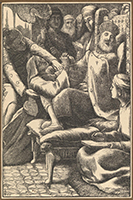 These Panelists engaged in a live online conversation about art-based methods in legal scholarship, teaching and practice, inviting the audience to participate in an interactive discussion about 'art', 'law' and the 'and' between. With Alice Palmer , Ruth Buchanan, Sara Ramshaw and Sean Mulcahy. Questions for the panelists include:
Image: Dalziel Brothers and John Everett Millais, ‘The Unjust Judge’ (1863), illustration facing p. 313 for The Parables in Good Words, published by Strahan & Co., London and Edinburgh, 1863. Source: National Gallery of Victoria |
Thursday 7 October 2021
| The Past, Present, and Future of International Law and the HumanitiesProfessor Hilary Charlesworth was joined in conversation with Professor Anne Orford to discuss the founding of IILAH in 2005 and the shifting relations between international law and the humanities. |
Tuesday 12 October 2021
| Violent Modernities: Cultural Lives of Law in the New India (OUP 2021) Oishik Sircar in conversation with Dianne Otto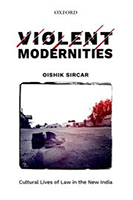 Violent Modernities uses a critical legal perspective to show that law and violence in the postcolony share a deep intimacy, where one symbiotically feeds the other. Researched and written between 2008 and 2018, the chapters study the cultural sites of literature, cinema, people's movements, popular media and the university to illustrate how law's promises of emancipation and performances of violence live a life of entangled contradictions. |
Thursday 14 October 2021
| Book Launch and Festival Closing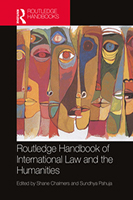 The close out the festival was an online celebration, to launch the Routledge Handbook on International Law and the Humanities, with editors Shane Chalmers and Sundhya Pahuja and guest reader, Danish Sheikh, along with appearances from several chapter contributors. This Handbook brings together 40 of the world’s leading scholars and rising stars who study international law from disciplines in the humanities – from history to literature, philosophy to the visual arts – to showcase the distinctive contributions that this field has made to the study of international law over the past two decades. The handbook includes authors from Australia, Canada, Europe, India, South Africa, the UK and the USA. |